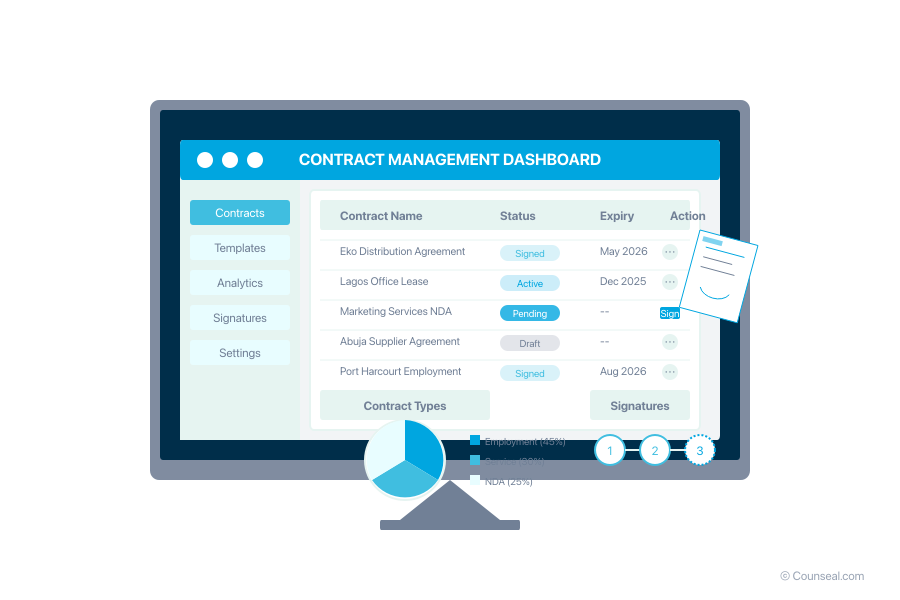Understanding the Different Types of Business Contracts for Nigerian Entrepreneurs

by Counseal Team
Updated May 26, 2025

Whether you’re launching your first venture in Lagos or managing an established business in Abuja, contracts are the foundation of your entrepreneurial journey. They’re more than just legal documents—they establish clear expectations, protect your interests, and ensure smooth business operations. Think of them as the guardrails that keep your deals on track and prevent costly misunderstandings.
Whether you’re launching your first venture in Lagos or managing an established business in Abuja, contracts are the foundation of your entrepreneurial journey. They’re more than just legal documents—they establish clear expectations, protect your interests, and ensure smooth business operations. Think of them as the guardrails that keep your deals on track and prevent costly misunderstandings.
Without a solid grasp of business contracts, you risk unclear payment terms, unexpected liabilities, or disputes that could have been avoided with proper documentation. A 2023 study by the Nigerian Bureau of Statistics revealed that over 40% of business disputes resulted from inadequate or nonexistent contract documentation.
Let’s explore the essential contract types every Nigerian entrepreneur should understand to build stronger, more secure business relationships.
Basic Concepts of Business Contracts
What is a Business Contract?
A business contract is a legally binding agreement between two or more parties that outlines the terms and conditions of a business relationship or transaction. It serves as your written roadmap, ensuring all parties have the same understanding of their obligations.
Key Elements of a Valid Contract
For a contract to be legally enforceable in Nigeria, it must contain these essential elements:
- Offer and Acceptance: One party proposes an arrangement, and the other agrees.
- Consideration: What each party gives or receives in exchange—money, goods, services, or promises.
- Legal Capacity: All parties must have the legal ability to enter a contract (of sound mind and not minors).
- Lawful Purpose: The contract must be for a legal purpose under Nigerian law.
- Mutual Consent: Both parties must genuinely agree to the terms without coercion or misrepresentation.
When these elements align properly, you’ve created a solid foundation for your business dealings and established a safety net if things don’t go as planned.
Overview of Key Contract Types for Nigerian Businesses
1. Employment Contracts
Employment contracts define the employer-employee relationship, covering everything from compensation and benefits to job responsibilities and termination conditions.
A well-drafted employment contract prevents costly disputes. Imagine this scenario: you’ve hired a brilliant marketing manager, but months later, they claim you promised a higher salary or different working conditions. Without clear written terms, you’re vulnerable to claims that could damage both your finances and reputation.
In Nigeria, tailoring these contracts to comply with the Labour Act and other relevant employment laws is essential. Recent amendments to Nigerian labour laws have strengthened employee protections, making comprehensive employment contracts even more crucial.
Key Components of an Employment Contract:
- Clear job description and responsibilities
- Compensation details (salary, bonuses, benefits)
- Working hours and leave entitlements
- Confidentiality clauses to protect business information
- Termination conditions and notice periods
- Dispute resolution mechanisms

2. Sales and Service Contracts
Sales and service contracts govern transactions where you’re selling goods or providing services. These agreements detail payment terms, delivery schedules, quality specifications, and remedies if either party fails to meet obligations.
For example, if you’re supplying textiles to retailers across Nigeria, a detailed sales contract ensures you receive timely payment while the buyer receives goods matching agreed specifications. These contracts serve as your safety net when business relationships face challenges.
The Nigerian economic landscape—with its unique supply chain challenges and payment practices—makes well-crafted sales contracts particularly valuable. In a country where business often operates on relationships and trust, written contracts provide necessary structure and protection.
Key Components of a Sales Contract:
- Detailed description of goods or services
- Pricing and payment terms
- Delivery schedule and logistics
- Warranty information and quality standards
- Risk allocation between parties
- Remedies for breach of contract
3. Partnership Agreements
If you’re going into business with others, a partnership agreement is non-negotiable. This contract establishes how your business will operate, covering profit-sharing, decision-making processes, and exit strategies.
A partnership agreement is essentially a business prenup—it protects each partner’s interests and ensures smooth operations by planning for both success and potential challenges. According to the Corporate Affairs Commission, partnership disputes are among the leading causes of business dissolution in Nigeria.
Key Components of a Partnership Agreement:
- Capital contributions from each partner
- Profit and loss distribution formulas
- Management responsibilities and decision-making authority
- Dispute resolution mechanisms
- Exit strategies and succession planning
- Non-compete and confidentiality provisions
4. Lease Agreements
For most Nigerian businesses, leasing commercial space represents a significant commitment. A lease agreement defines the terms under which you rent property, covering everything from monthly payments to maintenance responsibilities.
Whether you’re leasing office space in Victoria Island or a kiosk in Kaduna’s central market, a comprehensive lease protects your right to occupy the space while clarifying your obligations to the property owner.
Key Components of a Lease Agreement:
- Lease duration and renewal options
- Rent amount, payment schedule, and security deposit
- Permitted use of the property
- Maintenance and repair responsibilities
- Termination conditions and penalties
- Options for subletting or assignment
5. Non-Disclosure Agreements (NDAs)
In today’s competitive business environment, protecting your intellectual property and trade secrets is paramount. Non-disclosure agreements prevent others from sharing your confidential information, whether they’re employees, vendors, or potential investors.
NDAs are particularly important in Nigeria’s growing tech and innovation sectors, where proprietary information often represents a significant competitive advantage.
Key Components of an NDA:
- Clear definition of what constitutes confidential information
- Specific permitted uses of the information
- Duration of confidentiality obligations
- Exceptions to confidentiality requirements
- Remedies for unauthorized disclosure
- Return or destruction requirements for confidential materials
Key Considerations in Business Contracts
Legal Requirements
Understanding your legal obligations isn’t just about avoiding penalties—it’s about safeguarding your business interests. Nigerian contract law, based primarily on common law principles with statutory modifications, requires careful attention to detail.
The Companies and Allied Matters Act (CAMA) 2020 introduced significant changes affecting business contracts in Nigeria. Ensuring your contracts comply with these updated regulations will protect your business from unnecessary legal complications.
Importance of Legal Counsel
While it may be tempting to download template contracts online, investing in qualified legal counsel is invaluable. A lawyer experienced in Nigerian business law can:
- Draft contracts tailored to your specific business needs
- Ensure compliance with current Nigerian regulations
- Identify and address potential vulnerabilities
- Negotiate terms that protect your interests
- Provide guidance when disputes arise
Think of legal counsel as an investment rather than an expense—one that can prevent costly disputes and protect your business’s future.
Negotiation Strategies
Effective Negotiation Techniques
Negotiating business contracts is much like haggling at Balogun Market—it requires preparation, strategy, and finesse. Begin by thoroughly understanding your own objectives and what you’re willing to compromise on.
Successful Nigerian entrepreneurs approach negotiations with these strategies:
- Research the other party’s needs and constraints
- Prepare multiple options that satisfy both parties’ core interests
- Prioritize relationship-building alongside deal-making
- Balance assertiveness with cultural sensitivity
- Focus on creating sustainable agreements rather than quick wins
Finding Common Ground
Contract negotiation isn’t about winning at the other party’s expense—it’s about creating arrangements where both sides benefit. This approach builds the foundation for lasting business relationships.
When negotiating with potential partners or clients, listen actively to their concerns and look for creative solutions that address both parties’ priorities. Remember that in Nigeria’s relationship-focused business culture, maintaining respect and goodwill often proves as valuable as securing favorable terms.
Common Pitfalls and How to Avoid Them
Overlooking Critical Clauses
Many entrepreneurs focus exclusively on price and payment terms while neglecting equally important contract provisions. This oversight can lead to significant problems when unexpected situations arise.
Critical clauses that Nigerian businesses often overlook include:
- Force Majeure: Particularly important given Nigeria’s infrastructure challenges and political uncertainties
- Dispute Resolution: Specifying arbitration can save substantial time and money compared to litigation
- Governing Law: Especially crucial for international contracts
- Termination Conditions: Clearly defining how parties can end the relationship
To avoid these pitfalls, use a comprehensive checklist when reviewing contracts and consider having an attorney review important agreements before signing.
Ensuring Clarity and Specificity
Ambiguous language leads to disputes. Ensure your contracts use clear, specific terms with precise definitions for key concepts.
For example, rather than stating delivery will occur “promptly,” specify “within 14 business days of payment confirmation.” Instead of requiring “reasonable quality,” detail the exact specifications the goods must meet.
Avoid legal jargon when simpler language will suffice. The goal is a contract that both parties fully understand and can implement without confusion.
Tools and Resources for Contract Management
Digital Contract Management Solutions
Modern technology offers powerful tools to streamline contract creation, signing, and management. These solutions can transform what was once a paper-heavy, error-prone process into an efficient digital workflow.
Recommended Digital Tools:
- DocuSign: Perfect for securing electronic signatures when finalizing agreements
- Concord: Offers comprehensive contract lifecycle management with approval workflows
- ContractWorks: Provides AI-powered contract organization and automatic deadline alerts
- PandaDoc: Combines contract creation, sending, and tracking with interactive quoting
These platforms can significantly reduce administrative burden while improving compliance and reducing risks. According to a 2024 survey, Nigerian businesses using digital contract management tools reported 37% fewer contract disputes and 42% faster transaction completion.

Useful Resources for Nigerian Entrepreneurs
Knowledge is your best asset when navigating business contracts. These resources offer valuable guidance specific to the Nigerian business environment:
- Corporate Affairs Commission: Offers guidance on regulatory compliance for businesses
- Lagos Chamber of Commerce Business Resources: Includes contract templates and business guides
- Small and Medium Enterprises Development Agency of Nigeria: Provides resources specifically for small business owners
Practical Implementation: Putting Knowledge into Action
Review Existing Contracts
Begin by examining your current business agreements. Do they contain all the essential elements we’ve discussed? Are they compliant with current Nigerian regulations? Consider having an attorney review your most important existing contracts to identify potential vulnerabilities.
Standardize Your Approach
Develop standard templates for contracts you use regularly, such as customer agreements or vendor contracts. This creates consistency while reducing the time needed to draft new agreements.
Establish Contract Management Processes
Create clear procedures for contract review, approval, storage, and monitoring. Assign responsibility for tracking key dates like renewal deadlines or payment milestones. Even small businesses benefit from systematic contract management.
Invest in Relationship Building
While strong contracts protect your interests, successful business partnerships in Nigeria also depend on trust and mutual respect. Use the contract negotiation process as an opportunity to build relationships, not just secure favorable terms.
Conclusion: Securing Your Business Future
Business contracts serve as the infrastructure supporting your entrepreneurial journey. They provide structure, clarity, and protection—essential elements for sustainable success in Nigeria’s dynamic business environment.
By understanding different contract types, recognizing essential components, and implementing sound management practices, you position your business for growth while minimizing risks. Whether you’re negotiating with suppliers in Kano, hiring talent in Port Harcourt, or forming partnerships in Enugu, well-crafted contracts will serve as your business foundation.
Remember that seeking expert guidance is often the most cost-effective approach to contract development. Legal professionals can help you navigate complexities while ensuring your agreements serve your business objectives.
Ready to strengthen your business with professional legal guidance? Schedule a free strategy session with our experts at Counseal to discuss your specific contract needs.
This article provides general information and should not be considered legal advice. Always consult with a qualified legal professional for guidance on your specific situation.





